
George Washington "Wash" Phillips was an American gospel and gospel blues singer and instrumentalist. The exact nature of the instrument or instruments he played is uncertain, being identified only as "novelty accompaniment" on the labels of the 78 rpm records released during his lifetime.
Jagjaguwar is an American independent record label based in Bloomington, Indiana.
"Lost in the World" is a song by American hip hop recording artist Kanye West from his fifth studio album, My Beautiful Dark Twisted Fantasy (2010). The song features vocals by Justin Vernon of indie folk band Bon Iver, as well as sampling his 2009 song "Woods". It also contains portions of "Soul Makossa" written by Manu Dibango, and samples of "Comment No. 1", performed by Gil Scott-Heron. It was produced by West and Jeff Bhasker, who wrote the track with Vernon and Malik Jones. "Lost in the World" was initially leaked on September 29, 2010, and was 5 minutes and 55 seconds long. The version on the album was divided into two parts, with the outro becoming a new track entitled "Who Will Survive in America".

Bon Iver is an American indie folk band founded in 2006 by singer-songwriter Justin Vernon.

Justin DeYarmond Edison Vernon is an American singer, songwriter, producer and multi-instrumentalist. He is best-known as the primary songwriter and frontman of indie folk band Bon Iver. He is also a member of the bands Volcano Choir, Big Red Machine, the Shouting Matches, and Gayngs, and was previously a member of the now-defunct band DeYarmond Edison. Known for his distinct falsetto voice, Vernon has received widespread acclaim for his work, predominantly with Bon Iver.

For Emma, Forever Ago is the debut studio album by American indie folk band Bon Iver. It was first self-released in July 2007, and later saw wide release on the Jagjaguwar label in February 2008. The album is principally the work of singer-songwriter Justin Vernon. While living in Raleigh, North Carolina, Vernon fell ill with mononucleosis and a liver infection, and grew frustrated with his songwriting and life. He left Raleigh and drove to his father's remote hunting cabin an hour northwest of his hometown, Eau Claire, Wisconsin, hoping to be alone.

Blood Bank is a 2009 EP by Bon Iver. It was released on January 20, 2009, and features four tracks, three of them recorded for the release. The EP is a follow-up to the band's award-winning debut album For Emma, Forever Ago, self-released in 2007 by Bon Iver frontman and founder Justin Vernon, and re-released in 2008.

Colin Stetson is a Canadian-American saxophonist, multireedist, and composer based in Montreal. He is best known as a regular collaborator of the indie rock acts Arcade Fire, Bon Iver, Bell Orchestre, and Ex Eye. In addition to saxophone, he plays clarinet, bass clarinet, French horn, flute, and cornet.

New History Warfare Vol. 2: Judges is an album by musician/multi-reedist Colin Stetson. The album was released by Constellation Records in 2011.
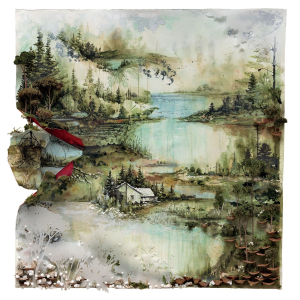
Bon Iver is the second studio album from American indie folk band Bon Iver, released on June 17, 2011. The album is composed of 10 songs and was seen as a new musical direction for the band.
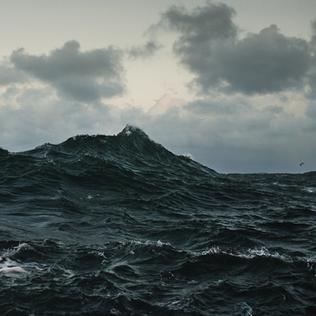
Repave is the second studio album by American indie rock band Volcano Choir, released on September 2, 2013 on Jagjaguwar. Recorded between November 2010 and March 2013, the album is self-produced by the band.
The 2013 edition of the Canadian Polaris Music Prize was presented on September 23, 2013 at The Carlu event theatre in Toronto, Ontario.
"Hold My Liquor" is a song by American rapper Kanye West, from his sixth studio album Yeezus (2013). It was primarily produced by West and longtime collaborator Mike Dean, who also provides a guitar solo, with additional production from Arca and Noah Goldstein. It features vocals from rapper Chief Keef and singer-songwriter Justin Vernon of Bon Iver. It is a house ballad that is built upon a pulsating synth beat with metallic stabs. In the song, West stumbles into an ex-girlfriend's home for reckless sex, with lyrics that contain references to substance abuse and issues with relationships and self-image.
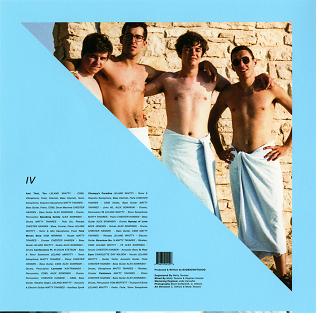
IV is the fourth studio album from Canadian jazz instrumental hip hop band BadBadNotGood. It was released on July 8, 2016. It features collaborations with Future Islands frontman Sam Herring, saxophonist Colin Stetson, Haitian-Canadian musician Kaytranada, American hip hop artist Mick Jenkins, and Canadian singer-songwriter Charlotte Day Wilson.
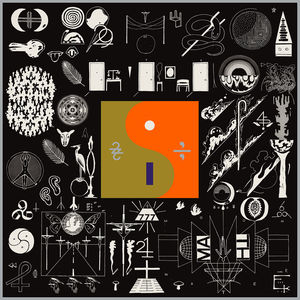
22, A Million is the third studio album by American indie folk band Bon Iver, released on September 30, 2016. Recorded in lead member Justin Vernon's April Base studio in Eau Claire, Wisconsin, the album marks a major shift in the band's sound and incorporates elements of electronic music and hip hop production influenced by Vernon's prior work with Kanye West. Most of the lyricism concerns Bon Iver's rise in popularity and how Vernon's relationship with the world has changed as a result.

All This I Do for Glory is the fifth solo studio album of American bass saxophonist Colin Stetson, released in April 2017 by the label 52 Hz. It is the first of a two-part album series by Stetson that explores two different arcs of the same character. The LP follows a narrative, a doomed love story set during a time between Never Were the Way She Was (2015) and New History Warfare Vol. 1 (2008). All This I Do For Glory differs from Stetson's previous releases due to its emphasis on his breathing techniques in the sound, it contains elements of 1990s experimental music and IDM, and its increased focus on rhythm that makes it more accessible to most listeners. The LP was critically well-received upon its release for Steston's skill of performing many sounds with one instrument, his recording methods, the pacing of the music, and the increased restraint on his maximalist sound.
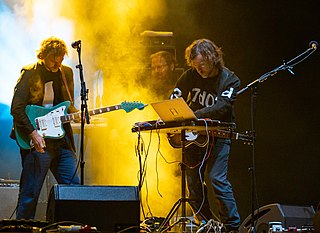
Big Red Machine is an American indie folk band that began as a collaboration between musicians Aaron Dessner and Justin Vernon. The band is named after the nickname for the dominant 1970s Cincinnati Reds baseball teams, which won the 1976 World Series in Dessner's birth year.

"Hey, Ma" is a song recorded by American indie folk band Bon Iver. It was released on June 3, 2019, as the lead single from their fourth studio album, I, I through Jagjaguwar, alongside "U ".
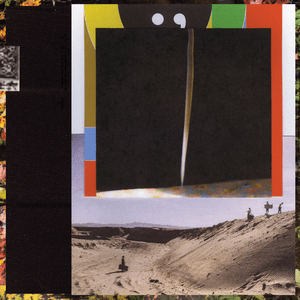
I, I is the fourth studio album by American indie folk band Bon Iver. It was released track by track per hour on August 8, 2019; the intro only being available on the Bon Iver fan subreddit until August 9, when the album was released properly on all services, with a physical release to follow on August 30. The album was preceded by the singles "Hey, Ma" and "U ", and the tracks "Faith" and "Jelmore" were released alongside the album pre-order. I, I features contributions from James Blake, Aaron Dessner, Bruce Hornsby, Moses Sumney, and Channy Leaneagh, among others. The album was nominated for Best Recording Package, Album of the Year and Best Alternative Music Album at the 62nd Annual Grammy Awards, as well as Record of the Year for the song "Hey, Ma".
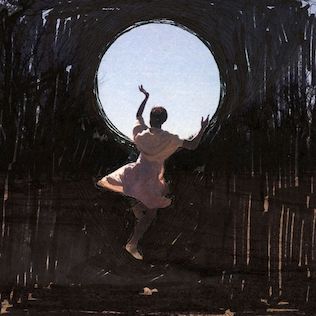
"Yi" and "iMi" are songs by American indie folk band Bon Iver from their fourth studio album, I, I (2019). The songs are the first two tracks on the album, with the former being a 31-second phone recording that serves as an intro to the latter. Both songs were produced by Justin Vernon, Brad Cook, and Chris Messina, with additional production by BJ Burton. "Yi" and "iMi" feature additional production by Trevor Hagen and Andrew Sarlo, respectively.
















